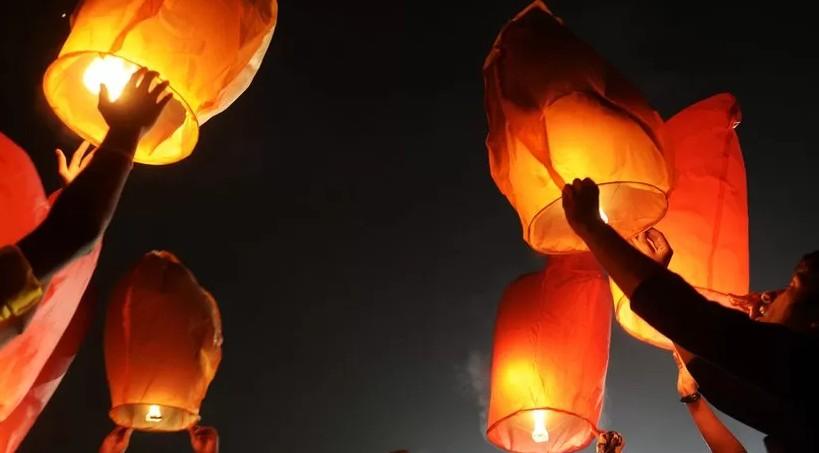Don't release memorial balloons, mourners urged

Balloon releases have been prohibited by all Welsh councils since 2018
- Published
People in a Welsh county who want to commemorate deaths are to be reminded that releasing balloons and lanterns is banned.
However, officials in Flintshire say they are wary of sending staff to confront those who are grieving because of the sensitive nature of the occasion.
Instead, the council will publicise the ban, which has been adopted by all Welsh councils since 2018.
It comes as Flintshire is looking at adopting a policy on all such memorials due to a growing demand since the Covid pandemic.
The demand is for tributes in open spaces, countryside and roads, councillors were told.
According to the Local Democracy Reporting Service, chief planning officer Andrew Farrow said there is no current policy, so the council struggles to defend decisions to turn down proposals which are unacceptable.
Flintshire said it welcomes requests, and people can buy trees or benches in memory of loved ones.
But some have had to be turned down because of road safety, if, for example, they cause a distraction or obstruction to pedestrians or cyclists.
Councillor Dan Rose said balloon and lantern releases are banned because of the potential risks of litter, fire, and to animals.
Mr Rose called releasing balloons “a nightmare of a thing that shouldn’t be allowed, just like lanterns.”
'Very emotionally charged'
Access and natural environment manager Tom Woodall said he was wary of sending staff to confront grieving people about the gesture.
He said: “I’m mindful of my staff going into a group of very emotionally charged people, to become floated all over Facebook as an over-bureaucratic officer.
“I think there could be an opportunity as they come on site to have that conversation but really once they’re on site and they’ve all got the balloons the moment has passed.

Sky lanterns have also been banned amid concerns over their potential to cause damage
“But I do agree with you, out of this we could well publicise it so people know Flintshire’s position, but I do have to be mindful of my staff and putting them into that kind of position.”
Mr Woodall said many people want a tree as a memorial, but officers are not keen on permanent plaques.
A commemorative book for visitor centres or hosted online was suggested as an alternative idea.
Examples of appropriate memorials could include planting an unmarked tree, hedge, small orchard or wild flowers, conservation of a historic feature, or sponsoring an event.
Councillor Mike Peers told officials: “I think you’ve done well to recognise the sensitivity and find a way forward that doesn’t impact on the people that are bereaved.”
The council’s cabinet will make a decision later on adopting the policy.